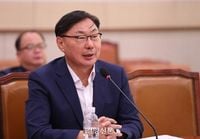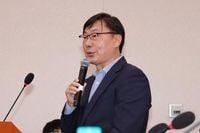On June 5, 2025, South Korea's Supreme Court delivered a definitive blow in a high-profile corruption case, confirming a prison sentence of 7 years and 8 months for Lee Hwa-young, the former Vice Governor for Peace of Gyeonggi Province. The ruling, handed down by the Supreme Court’s 2nd Division under presiding Justice Park Young-jae, also upheld a fine of 250 million won and a forfeiture of approximately 326 million won. Lee was convicted of receiving substantial bribes and political funds from the Ssangbangwool Group and conspiring in an 8 million dollar illegal remittance to North Korea.
The case centers on allegations that between July 2018 and July 2022, Lee accepted around 330 million won in political funds and bribes from Ssangbangwool, a conglomerate implicated in illicit financial dealings with North Korea. Prosecutors charged Lee with violations of the Specific Aggravated Punishment Act, the Political Funds Act, and the Foreign Exchange Transaction Act. The 7-year sentence stems from bribery and foreign exchange violations, with an additional 8 months for political funds law breaches.
At the heart of the scandal lies the so-called Ssangbangwool North Korea remittance case. Authorities allege that the company illegally transferred 8 million dollars to North Korea, purportedly covering two major expenses: 5 million dollars for a smart farm project in North Korea, and 3 million dollars to finance a visit to North Korea by then-Gyeonggi Province Governor Lee Jae-myung, now the President of South Korea. The smart farm project was part of a broader initiative to foster inter-Korean cooperation, but the funding mechanism raised red flags due to its clandestine nature.
Lee Hwa-young was indicted in October 2022, accused of conspiring with Ssangbangwool to facilitate the transfers. The initial trial sentenced him to 9 years and 6 months in prison, alongside the fines and forfeitures, but the appellate court later reduced the sentence to 7 years and 8 months while maintaining the guilty verdict. The Supreme Court’s recent decision affirms this ruling, dismissing appeals from both the prosecution and the defense.
Notably, Bang Yong-cheol, the former Vice Chairman of Ssangbangwool Group and an accomplice in the case, received a confirmed sentence of 2 years in prison with a 3-year probation period. The Supreme Court emphasized that the lower court's judgment was sound, stating there was no error in evaluating witness credibility or in the legal reasoning applied to establish guilt.
Throughout the proceedings, Lee Hwa-young claimed that the 5 million dollars allocated to the smart farm project was an investment by Ssangbangwool aimed at boosting its stock price, rather than illicit funding. However, this defense was rejected by the courts. The judges found that the primary motive for the payment was to fulfill Lee’s request for the illegal remittances, a critical factor in the bribery charges. Similarly, the court dismissed claims that Lee was not involved in authorizing the 3 million dollars for the gubernatorial visit to North Korea, highlighting that without his request, Ssangbangwool’s former chairman Kim Seong-tae would not have engaged North Korean officials or pursued the business ventures.
The testimonies of Kim Seong-tae and other witnesses were deemed credible and consistent, despite defense arguments alleging coercion or manipulation during prosecutorial investigations. The court specifically rejected allegations of ‘alcohol parties’ and seminars aimed at influencing witness statements, affirming the integrity of the judicial process.
This ruling has profound implications for President Lee Jae-myung, who was separately indicted in June 2024 on charges linked to the same North Korea remittance scandal. Prosecutors allege that Lee, during his tenure as Gyeonggi Province Governor, instructed and approved the illegal payments covered by Ssangbangwool. His trial is ongoing at the Suwon District Court, with a preparatory hearing scheduled for June 22, 2025.
However, the future of President Lee’s trial is clouded by legal uncertainties surrounding the constitutional immunity granted to sitting presidents under Article 84. This provision shields the President from criminal prosecution during their term except in cases of rebellion or treason. Legal experts and judicial authorities are divided on whether this immunity applies to ongoing trials initiated before a president’s election. The Supreme Court’s administrative office has indicated that individual trial courts must decide the matter, leaving the path forward unclear.
Moreover, the Democratic Party is pursuing legislative amendments to the Criminal Procedure Act that would mandate the suspension of any criminal proceedings against the President upon a cabinet announcement. Should this law pass and be enacted, it would effectively halt President Lee’s trial immediately.
Lee Hwa-young’s conviction marks the first major guilty verdict confirmed among President Lee’s close aides since his inauguration, underscoring the political and legal storm surrounding the North Korea remittance case. The courts have recognized that a significant portion of the illicit funds—3.94 million dollars—were directly linked to the smart farm project and the presidential visit expenses, confirming suspicions that the Ssangbangwool payments were made on behalf of Gyeonggi Province rather than as independent corporate investments.
During the trials, Lee Hwa-young was also found guilty of receiving corporate perks such as company credit cards, vehicles, and fictitious salaries paid to his associates, amounting to over 330 million won in political funds. Prosecutors classified approximately 259 million won of this as bribes tied to the North Korea projects.
The first trial court sentenced Lee to 9 years and 6 months, with the appellate court reducing the term but maintaining the conviction. The Supreme Court’s dismissal of all appeals solidifies the legal findings and penalties.
Despite the verdicts, Lee Hwa-young and his defense team have continued to challenge the process, alleging prosecutorial misconduct and witness tampering efforts. These claims were consistently rejected by the courts, which found no evidence of impropriety affecting the trial’s fairness.
As the political and judicial drama unfolds, all eyes remain on the upcoming proceedings involving President Lee Jae-myung. The Supreme Court’s confirmation of Lee Hwa-young’s sentence not only cements accountability for the former vice governor but also casts a long shadow over the President’s legal battles. Whether the constitutional protections and pending legislative changes will shield the President from prosecution remains a pivotal question in South Korea’s political landscape.
This case highlights the complexities of inter-Korean relations, domestic politics, and legal boundaries, intertwining issues of corruption, diplomacy, and governance. The saga serves as a potent reminder of the challenges faced when political figures and business interests intersect in sensitive geopolitical contexts.


